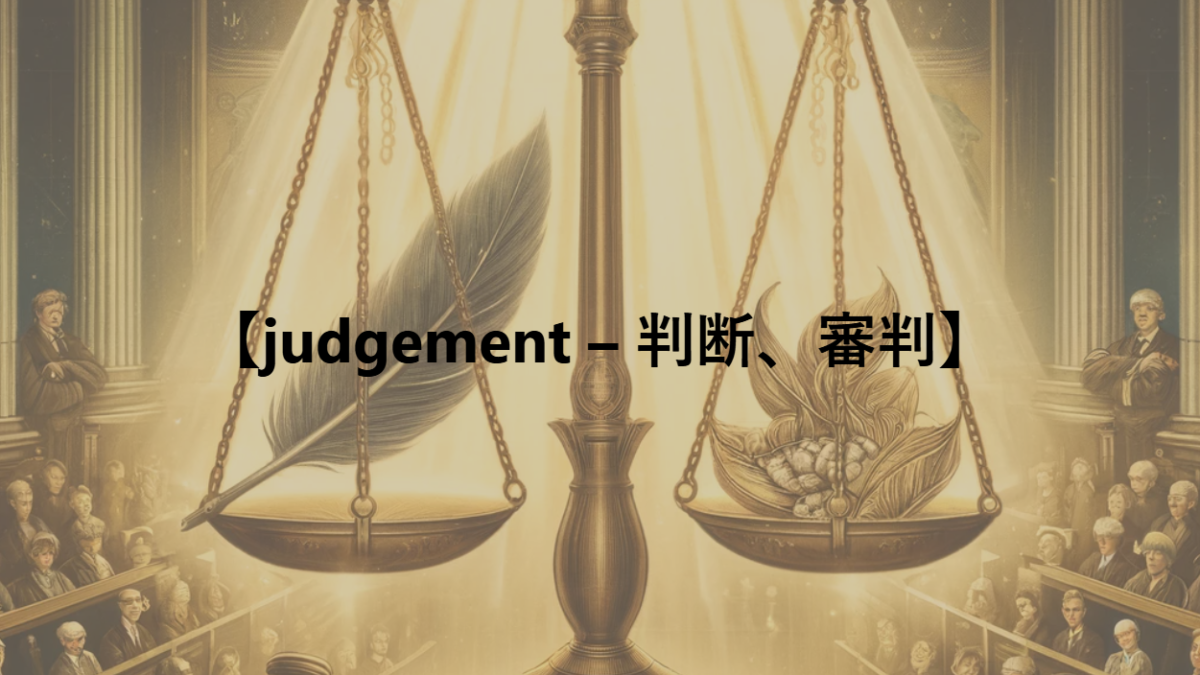語源・類義語・反対語・例文
【judgement – 判断、審判】という単語の語源とか由来を知っていますか?
“Judgement”(判断、審判)という単語は、古英語の “dēmung” から来ています。これは、”dēman” という動詞から派生しており、「判断する」や「決定する」を意味します。”dēman” 自体は、ゲルマン語源にさかのぼりますが、これはラテン語の “iudicare”(判断する)と同根であり、ラテン語の “iudicium”(裁判、審判)に対応します。この言葉は、時間が経つにつれて進化し、中英語を経て現代英語の “judgement” へと発展しました。”Judgement” は、ある状況や事象に関して意見や決定を下す行為、またはその能力を指し、法的な文脈では、裁判所が下す正式な決定や評価を意味する場合もあります。
The word “judgement” originates from the Old English “dēmung,” which derives from the verb “dēman,” meaning “to judge” or “to decide.” The verb “dēman” itself traces back to a Germanic root, which is cognate with the Latin “iudicare” (to judge) and corresponds to the Latin “iudicium” (judgment, trial). Over time, the word evolved, passing through Middle English to become “judgement” in Modern English. “Judgement” refers to the act or capability of forming an opinion or decision about a situation or event, and in a legal context, it can also mean a formal decision or evaluation made by a court.
この単語の類義語・反対語を教えてください。
類義語
- Decision – 決定
- Assessment – 評価
- Opinion – 意見
- Verdict – 裁定
- Evaluation – 評価
- Determination – 決意
- Conclusion – 結論
- Appraisal – 鑑定
- Ruling – 裁決
- Adjudication – 裁判
反対語
- Indecision – 優柔不断
- Uncertainty – 不確実性
- Ambiguity – あいまいさ
- Doubt – 疑問
- Hesitation – ためらい
この単語に似た単語で間違いやすい単語はありますか?
- Judgment:
- “Judgement”と”Judgment”は、同じ意味を持ちますが、スペルが異なります。”Judgment”はアメリカ英語での一般的な綴りであり、”Judgement”はイギリス英語でよく見られます。両方とも、意見や決定を下す行為や能力を指します。
- Assessment:
- “Assessment”は、特定の事象や人物の価値や品質を評価するプロセスを指します。”Judgement”と似ていますが、”Assessment”はよりフォーマルな評価や分析を意味することが多いです。
- Opinion:
- “Opinion”は個人的な見解や信念を意味し、”Judgement”よりも主観的なニュアンスを持ちます。”Judgement”は判断や決定を下す際のより公正または客観的なプロセスを指すことがあります。
- Decision:
- “Decision”は選択肢の中から一つを選ぶ行為を指します。”Judgement”と密接に関連していますが、”Decision”は特定の行動や選択に焦点を当てることが多いです。
この単語を使った例文を5つほど教えてください。
She trusted her own judgement and made the decision to start her own business.
(彼女は自分の判断を信じて、自分のビジネスを始める決断をしました。)
The judge’s judgement was based on the evidence presented in the court.
(判事の判断は、法廷で提示された証拠に基づいていました。)
It’s not fair to make a judgement about someone without knowing their full story.
(全体の事情を知らずに誰かを判断するのは公平ではありません。)
The teacher praised the student for his excellent judgement in solving the complex problem.
(教師はその生徒の複雑な問題解決における優れた判断を称賛しました。)
I rely on my friend’s judgement when it comes to choosing movies, as he has great taste.
(映画の選択に関しては、友人の判断に頼ります。彼は素晴らしいセンスを持っています。)
【judgement – 判断、審判】のコロケーション
- Pass judgement – 判断を下す
- 人や状況についての意見や評価を表明する行為です。しばしば、十分な情報に基づいて公平な評価を意味しますが、時には早急かつ主観的な判断を示すこともあります。
- Final judgement – 最終判断
- ある問題に関して最後に下される決定や評価です。特に、法律の文脈で用いられることが多く、裁判の結果としての最終的な審判を指します。
- Poor judgement – 誤った判断
- 不適切または誤った判断を指す表現で、しばしば個人の決定が望ましくない結果を招いた場合に用いられます。
- Sound judgement – 健全な判断
- 理性的で合理的な根拠に基づく賢明な判断を意味します。この表現は、個人が熟考に基づいて賢明な選択をした場合に使われることが多いです。
- Judgement call – 判断の呼びかけ
- 特定の状況において、明確な答えが存在しないために個人が下すべき判断を指します。このフレーズは、主観的な評価や決断が必要な状況を表現する際に用いられます。
“Judgement”(判断、審判)という単語は、人々の意見形成、評価、決定過程において中心的な役割を果たします。この単語に関連するコロケーションには、「判断を下す」、「最終判断」、「誤った判断」、「健全な判断」、そして「判断の呼びかけ」といった表現が含まれます。これらは、ある人や状況に対する評価を表明する行為、法的な文脈での最終的な決定、不適切な選択による結果、理性的な基準に基づく賢明な判断、そして明確な答えがない状況で必要とされる主観的な決断を指します。
「判断を下す」は、一般に、人が状況を評価し、その結果に基づいて意見を形成するプロセスを意味します。「最終判断」は、ある問題に対する決定的な評価や決定を指し、しばしば裁判の結果として用いられます。「誤った判断」は、望ましくない結果を招いた不適切な決定を指しますが、「健全な判断」は、合理的で賢明な選択を表します。「判断の呼びかけ」は、特定の状況下で個人が下すべき主観的な評価や決断を意味し、明確な正解が存在しない場合に特に使用されます。
これらのコロケーションは、”judgement”が日常生活、職場、さらには社会全体の中でいかに重要な概念であるかを示しています。適切な判断能力は、個人の成功や、より広い意味での社会の調和と進歩に不可欠です。それぞれの表現は、判断のプロセスの異なる側面を照らし出し、私たちが直面する様々な状況に対する理解を深めるのに役立ちます。
The term “judgement” plays a central role in the process of forming opinions, assessments, and decision-making among people. Related collocations include “pass judgement,” “final judgement,” “poor judgement,” “sound judgement,” and “judgement call.” These expressions refer to the act of expressing an evaluation of a person or situation, the definitive evaluation or decision in a legal context, the outcome of an improper choice, a wise decision based on rational criteria, and the subjective decision required in a situation where there is no clear answer, respectively.
“Pass judgement” generally signifies the process by which an individual evaluates a situation and forms an opinion based on the outcome. “Final judgement” refers to the conclusive assessment or decision regarding an issue, often used in the context of a court’s decision. “Poor judgement” indicates an improper decision that leads to undesirable results, whereas “sound judgement” represents a wise and rational choice. “Judgement call” denotes the subjective evaluation or decision that an individual must make under specific circumstances, especially when there is no definitive right answer.
These collocations illustrate how “judgement” is an essential concept in everyday life, the workplace, and society at large. The ability to make appropriate judgements is crucial for personal success and, more broadly, for the harmony and progress of society. Each expression highlights different aspects of the judgement process, aiding in our understanding of the various situations we encounter.
文法問題
- 問題: The manager’s __ was critical in making the final decision.
(A) judgment
(B) judge
(C) judging
(D) judges
正解: (A) judgment
解説: この文では「judgment(判断)」が必要です。文脈から、名詞としての「judgment」が最も適しています。「judge」は「裁判官」や「判断する」という動詞の形で、この文には適しません。「judging」は動名詞や現在分詞で、ここでは文法的に不適切です。「judges」は「裁判官たち」という複数形で、この文の意味には合いません。 - 問題: Identify the sentence with correct grammar and usage of “judgment”:
(A) Her judgment on the case was unfair.
(B) He judgment the situation quickly.
(C) They are judgment very fast.
(D) She judgments the issues daily.
正解: (A) Her judgment on the case was unfair.
解説: (A) の文は文法的に正しく、「judgment」が適切に使われています。(B) の文では「judgment」が動詞の形で使われており、「He judged the situation quickly.」が正しいです。(C) の文では「are judgment」が文法的に不自然で、「They are judging very fast.」が正しいです。(D) の文では「judgments」が動詞の形で使われており、「She judges the issues daily.」が正しいです。 - 問題: His __ was affected by his personal biases.
(A) judgment
(B) judge
(C) judging
(D) judgments
正解: (A) judgment
解説: この文では、「判断力が彼の個人的な偏見に影響された」と言っています。名詞としての「judgment」が最も適しています。「judge」は「裁判官」や「判断する」という動詞の形で、この文には適しません。「judging」は動名詞や現在分詞で、ここでは文法的に不適切です。「judgments」は複数形で使われる場合もありますが、この文脈では「judgment」の単数形が適しています。 - 問題: Choose the correct sentence:
(A) The referee’s judgment was questioned by the players.
(B) The judgment referee was questioned by the players.
(C) The referee judgment was questioned by the players.
(D) The referee’s judgments was questioned by the players.
正解: (A) The referee’s judgment was questioned by the players.
解説: (A) の文は文法的に正しく、「judgment」が適切に使われています。(B) の文では「judgment referee」が不自然です。「The referee’s judgment」が正しいです。(C) の文では「referee judgment」が不自然で、「referee’s judgment」が正しいです。(D) の文では「judgments」が複数形で「was」と一致しないため、「judgment」が正しいです。 - 問題: Fill in the blank with the correct word:
Making a fair __ requires considering all the evidence.
(A) judgment
(B) judge
(C) judging
(D) judgments
正解: (A) judgment
解説: 「公平な判断をするには、すべての証拠を考慮する必要がある」という意味です。名詞としての「judgment」が最も適しています。「judge」は「裁判官」や「判断する」という動詞の形で、この文には適しません。「judging」は動名詞や現在分詞で、ここでは文法的に不適切です。「judgments」は複数形で使われる場合もありますが、この文脈では「judgment」の単数形が適しています。

